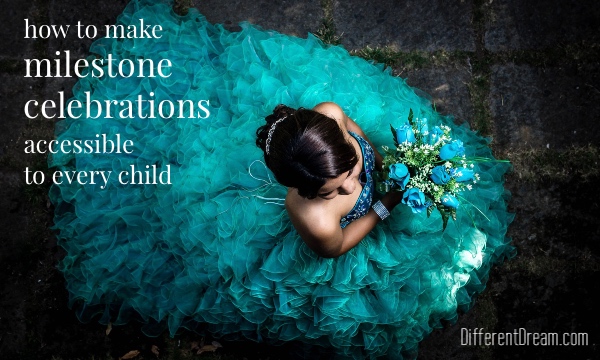Milestones, Traditions, and Celebrations for Kids with Special Needs

Milestones, traditions, and celebrations weave family members together by creating a shared history. Guest blogger Deborah Arrona explains how she makes sure Aria, her daughter with special needs, is an active participant in the milestones, traditions, and celebrations as she nears young adulthood.
Milestones, traditions, and celebrations are wonderful opportunities for including our children living with disability in our family and circle of people that do life with us. Last year, in our Mexican American culture, it was time for my daughter Aria’s quinceañera–quince for short–which is the celebration of a girl’s 15th birthday marking her passage from girlhood to womanhood. Aria lives with multiple medical fragilities which can be unpredictable so including her in any festivity requires planning and preparation. Theodore Roosevelt said, “Do what you can, with what you have, where you are.” We embraced those words of wisdom in the past, and more so with this major milestone, tradition, and celebration for Aria.
Each family’s situation is unique with the details of participation in any festivity at the discretion of the family. However, I would like to share a few key takeaways that encouraged me.
#1: Let Your Child Lead the Way
As your child is able and willing, let them participate and have a say as much as they can. Their consent is important and helps them feel even more included. Following their guidance also encourages a sense of responsibility over their life and helps develop self-advocacy skills that will empower them later in life.
Aria’s communication skills include facial expressions, body language and vocalizations. We asked her repeatedly over weeks and months if she wanted to have this event. We reminded her that it was for her birthday so we would be celebrating her anyway, but the scale of this event was up to her. We waited for her to respond in her way and in her time as long as we could. When certain plans required a decision by a deadline and she hadn’t communicated an obvious response, we did our best to honor what we thought she preferred. Even after we made decisions she had not responded to, we checked in with her to see if continuing was okay. She seems to appreciate that.
#2: Adapt and Modify
Adaptations and modifications are for your child and family’s benefit, no one else. It can be challenging to keep this in mind when there are others like extended family to consider. But doing what is right and best for your child living with disability is more important. Good rapport goes a long way too, so be as polite as possible, especially when met with resistance. You and your child are not obligated to explain any changes made for your disabled child, but remember that answering questions could bridge any gaps in understanding. Sometimes questions will be due to resistance. But more than likely, they are more about curiosity or even interest in supporting you.
If you put Aria’s quince and the quince of another15-year-old girl side by side, Aria’s had many similarities, but also several changes. The ceremony, usually held at a church, was at the hall with the reception and dance. She had a DJ who lowered the volume of the music for her. Instead of Aria giving a speech, I gave one in her honor. If changes include your child living with disability fully, that means your entire family is wholly included.
#3: If It Doesn’t Happen, It Doesn’t Happen
Sometimes, even with all the effort in the world, your child’s participation in a festivity is just not going to happen. Things may not go as you planned or how your child wanted–your child’s health status may change or some other factor may hinder what you are trying to do. If milestones, traditions, and celebrations don’t pan, it will be fine. Whatever works for your child and family is what is important.
In the week before Aria’s quince she had some symptoms associated with her medical fragilities flaring up. It looked like we were going to have to cancel her party. She had a dramatic turnaround in the 24 hours before the party started, and her smiles communicated approval to proceed as planned. However, if that hadn’t happened and she wasn’t up for the party, we were ready to call it off. Her guests were aware of how unpredictable Aria’s health can be and understood that a last minute cancellation was probable. They were glad Aria was well enough to continue with her quince as planned.
Ultimately the only option for us is to try our best to include our medically fragile daughter in all the milestones, celebrations and traditions she is able and willing to participate. We do the same every other facet of life like everyone else does. Effort makes a difference and reveals so much even when events don’t work out the way we hoped. As parents, doing what you can with what you have where you are, is all you need to maximize those opportunities. I hope that sharing my experience with Aria and her quince encourages any parent raising a child with a disability this holiday season and beyond.
POSTSCRIPT: Aria Arrona passed away only weeks after this entry was posted.
If you like what you read, you can sign up for the Different Dream RSS feed and monthly newsletter in the top, right column of this page. Thanks!

By Deborah Arrona
Deborah Arrona is a stay-at-home mom to Aria, a sweet and beautiful tweenage, 25 week micro-preemie survivor. Aria loves music and rolling in her wheelchair outside. She lives with multiple, medically complex special needs such as Periventricular Leukomalacia, Cerebral Palsy, Epilepsy, Cortical Visual Impairment and use of a feeding tube. Deborah and her husband, Salvador, are raising Aria together in the Houston area. When Deborah has time she enjoys singing, reading, movies, music and posting updates about Aria at Facebook.com/TeamAriaArrona.
2 Comments
Submit a Comment
Subscribe for Updates from Jolene
Related Posts
My Favorite Vacation Planning Tips for Special Needs Families
Are you traveling this summer? Jolene provides her favorite vacation planning tips for special needs families.
How to Build a Thriving Marriage as You Care for Children with Special Needs
Todd and Kristin Evans explain how to build a thriving marriage as you care for children with special needs.
How Do I Discern if Medication Is Best for my Child’s Behavioral Needs?
Heather Braucher explains her answer to the question, “How do I discern if medication is best for my child’s behavioral needs?”






I love your ideas! Honestly, I think this can be applied to most parents. Children always seem to have their own ideas for holidays and sometimes our best laid plans just don’t mesh with nap schedules or what our child wants/needs in that moment. I love this resource for holiday fun from A Day in Our Shoes, she shares craft projects and other activities geared towards special needs parenting, I think you’ll love it too!
https://adayinourshoes.com/family-fun-disabilities/holidays-special-needs/
So well written! Thank you for sharing your experiences and wisdom with the rest of us!!